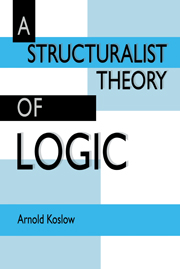Book contents
- Frontmatter
- Contents
- Preface
- Part I Background
- Part II Implication relations
- Part III The logical operators
- Part IV The modal operators
- 25 Introduction
- 26 Modality
- 27 Modals: Existence and nonextensionality
- 28 Special modals
- 29 The possibility of necessity-style modals
- 30 Modals revisited I
- 31 Quantification and modality
- 32 Modals revisited II
- 33 Knowledge, truth, and modality
- 34 The comparative strength of modals
- 35 Kripke-style systematization of the modals without possible worlds
- 36 Model functions, accessibility relations, and theories
- 37 Migrant modals
- Appendix A An implication relation for the integers in the programming language BASIC
- Appendix B Symmetric sequents as products of implication relations and their duals
- Appendix C Component-style logical operators and relevance
- Notes
- Bibliography
- Index
- Frontmatter
- Contents
- Preface
- Part I Background
- Part II Implication relations
- Part III The logical operators
- Part IV The modal operators
- 25 Introduction
- 26 Modality
- 27 Modals: Existence and nonextensionality
- 28 Special modals
- 29 The possibility of necessity-style modals
- 30 Modals revisited I
- 31 Quantification and modality
- 32 Modals revisited II
- 33 Knowledge, truth, and modality
- 34 The comparative strength of modals
- 35 Kripke-style systematization of the modals without possible worlds
- 36 Model functions, accessibility relations, and theories
- 37 Migrant modals
- Appendix A An implication relation for the integers in the programming language BASIC
- Appendix B Symmetric sequents as products of implication relations and their duals
- Appendix C Component-style logical operators and relevance
- Notes
- Bibliography
- Index
Summary
Our aim has been to study the modal operators as functions on implication structures. There is nothing mysterious or arcane about the kind of functions that they are, and there is nothing recherché about the particular examples that qualify as modal. It should come as no surprise, then, that some of the operators commonly studied in elementary logic and mathematics should turn out to have modal character. This should help reinforce the idea that some modals are quite familiar, ordinary, and uncontroversial. With this in mind, we turn to some elementary examples.
Power sets
The power set of a set A is the set of all the subsets of A. Suppose S is a set of sets (1) that is closed under finite intersections and unions of its members, and (2) for any set A in S, P(A) is in S, and (3) there are at least two members, A* and B*, of S such that neither is a subset of the other.
Let I = 〈S, ⇒〉 be an implication structure, where S is as described above, and for any sets A1, …, An and B in S, A1, …, An ⇒ B if and only if A1 ∩ … ∩ An ⊆ B.
- Type
- Chapter
- Information
- A Structuralist Theory of Logic , pp. 318 - 326Publisher: Cambridge University PressPrint publication year: 1992



